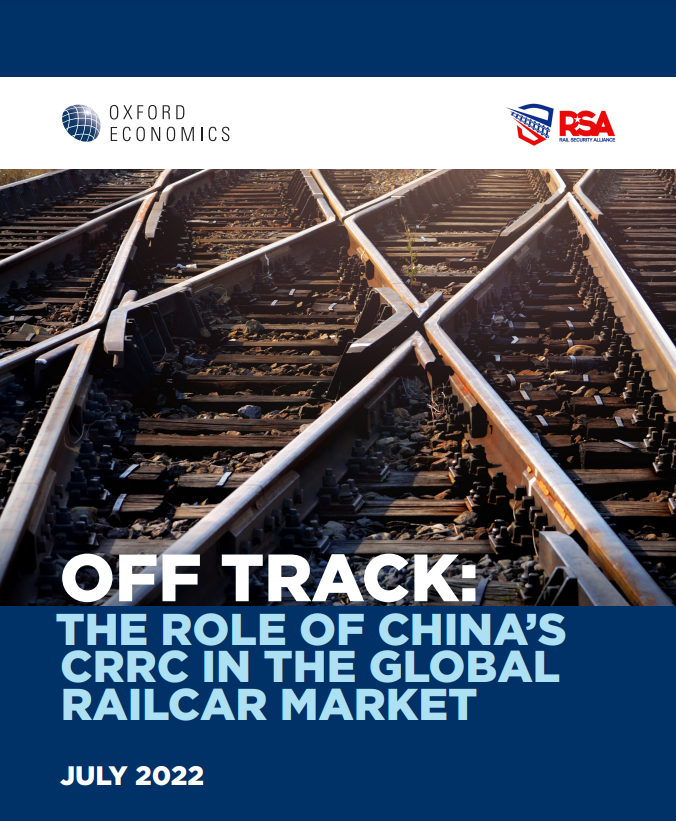Recent Release | 11 Jul 2022
Off Track – The role of China’s CRRC in the Global Railcar Market

Economic Consulting Team
Oxford Economics

This report for the Rail Security Alliance explores the role of Chinese state-owned enterprise (SOE) CRRC in the global railroad rolling stock market. It quantifies explicit Chinese government subsidies to CRRC; considers likely additional implicit subsidies; explores the history of Chinese SOE reform and recent policy towards national champion SOEs, and how these apply to CRRC; and considers the Chinese government’s strategic interest in the global rail industry. Finally, the report explores the available data relating to CRRC’s rolling stock sales outside of mainland China, particularly in the North American market.

With $35 billion in total revenue in 2021, CRRC, the Chinese state-owned railroad rolling stock manufacturer, is the largest player in the $71 billion global railroad rolling stock industry. According to its annual reports, CRRC received $271 million in explicit Chinese government subsidies in 2020, and nearly $1.3 billion total between 2015 and 2020. Estimates by other researchers show that implicit Chinese government subsidies to state-owned enterprises (SOEs) are on average about three times as large as explicit subsidies.
Under the management of the State-owned Assets Supervision and Administration Commission (SASAC) since 2003, Chinese SOEs have been encouraged to “go big and go global” through domestic consolidation and expansion, and through foreign mergers and acquisitions. The effect of this mercantilist policy has been for national champion SOEs like CRRC to capture their domestic markets, using the economic rents so generated to finance global expansion. As reflected in planning documents, the selection of industries for national champions reflects the strategic interests of the Chinese government. In the case of rail, the government’s strategic interest is transparent and is laid out in the Belt and Road Initiative (BRI)—China seeks to dominate an integrated global rail transportation network based on Chinese technical standards.
Between 2015 and 2020, CRRC won seven passenger rail projects in North America worth over $4.3 billion. It undercut the next lowest bidder on these projects by an average of 21%. However, despite the goals of the BRI, there is not clear evidence of a clear upward trend in CRRC’s penetration of rolling stock markets outside mainland China. The reason for CRRC’s failure, thus far, to significantly expand its share of these foreign markets is not certain, but likely reflects the long lead time of rail projects, as well as the success of investment restrictions by other countries against Chinese rail imports.
About the team
Our Economic Consulting team are world leaders in quantitative economic analysis, working with clients around the globe and across sectors to build models, forecast markets and evaluate interventions using state-of-the art techniques. Lead consultants on this project included:

Hamilton Galloway
Head of Consultancy, Americas
+1 (646) 503 3068

Hamilton Galloway
Head of Consultancy, Americas
New York, United States
Hamilton Galloway joined Oxford Economics in 2014 as Head of US Consultancy – a team focused heavily on developing quality, customized research, analysis and impact modeling services for a range of private and public organizations. Prior to joining Oxford Economics, Mr. Galloway worked nearly seven years as an economist, senior consultant and manager at Economic Modeling Specialists Int (EMSI), a data and analytic company based in the US.
Mr. Galloway’s work included building a consultancy presence in the US, conducting bespoke economic and labour market research and engaging public and private sector clients. In 2013/14 he lived and worked in the UK as a senior consultant, focusing on developing data-driven, decision-making analytics and reports for use across public entities and education. He has authored numerous reports, publications, as well as economic development user guides and even a textbook chapter.
You might be interested in

Post
Global Trade Education: The role of private philanthropy
Global trade can amplify economic development and poverty alleviation. Capable leaders are required to put in place enabling conditions for trade, but currently these skills are underprovided in developing countries. For philanthropists, investing in trade leadership talent through graduate-level scholarships is an opportunity to make meaningful contributions that can multiply and sustain global economic development.
Find Out More
Post
Mapping the Plastics Value Chain: A framework to understand the socio-economic impacts of a production cap on virgin plastics
The International Council of Chemical Associations (ICCA) commissioned Oxford Economics to undertake a research program to explore the socio-economic and environmental implications of policy interventions that could be used to reduce plastic pollution, with a focus on a global production cap on primary plastic polymers.
Find Out More
Post
The Economic Contribution of Mexico’s Audiovisual Industry
This report demonstrates the integral role that the AV industry plays in Mexico's economy by estimating the industry’s domestic economic footprint. The analysis comprises all aspects of the audiovisual industry, including film production, distribution, and exhibition; the production, distribution, and broadcast of television content on free-to-air and pay TV channels; and online video platforms. Our estimates provide a recent snapshot of the audiovisual industry, including impacts at the broader industry level and broken out by sub-sector.
Find Out More
Post
The socio-economic impact of TikTok in Australia
This report provides the results of our economic modelling of TikTok’s economic contribution to the Australian economy, as well as the findings of survey research into TikTok’s users and Australian businesses. It looks at the real world impacts users report as well as the diversity of TikTok’s online communities.
Find Out More